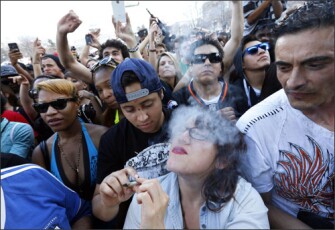
A national organization that trains school-based police officers says it supports Attorney General Jeff Sessions’ recent decision to lift an Obama-era directive that limited enforcement of federal marijuana laws in states that have legalized the drug.
That guidance, described in a 2013 memo, directed federal prosecutors to focus their enforcement efforts in those states on efforts to sell marijuana to minors, to divert the drug to states where it remains illegal, and to use profits from marijuana sales to fund gangs and criminal activity. Otherwise, the federal government “has traditionally relied on state and local agencies to address marijuana activity through enforcement of their own narcotics laws.
Some advocates for marijuana legalization have speculated that Sessions’ decision to withdraw that memo might stifle the growth of the marijuana industry in states where it has been legalized for medical or recreational purposes as would-be dispensary owners fear federal law enforcement actions. In a statement, the U.S. Department of Justice called Sessions’ decision a “return to the rule of law” and “a return of trust and local control to federal prosecutors.”
The National Organization of School Resource Officers, which offers training for school-based police, issued a statement in support of Sessions’ decision Monday, saying it “will make it more difficult for youth to obtain and use marijuana.”
“Our members have seen first-hand the effects of marijuana use on youth,” NASRO President Mo Canady said. “We are in favor of law enforcement that creates barriers to non-medical possession and use of this drug by minors.”
Student reports of marijuana use have fluctuated around the same levels since 2000, with some bumps and dips, data from the Centers for Disease Control and Prevention show.
Do teens in states where marijuana is legal use the drug more?
In a 2014 analysis of CDC data collected between 1993 and 2011 when 16 states legalized medical use of marijuana, researchers concluded that there was no statistical indication that high school students in those states were significantly more likely to use marijuana than their peers in states where pot remained completely illegal.
“Our results are not consistent with the hypothesis that the legalization of medical marijuana caused an increase in the use of marijuana among high school students,” said the study, a National Bureau of Economic Research working paper. “In fact, estimates from our preferred specification are small, consistently negative, and are never statistically distinguishable from zero.”
That same year, however, federal officials cited the publicity campaigns associated with efforts to legalize marijuana as a cause of shifting youth attitudes about the drug.
Photo: Partygoers listen to live music and smoke pot on the second of two days at the annual 4/20 marijuana festival in Denver on April 20 in 2014. The annual event is the first 4/20 marijuana celebration since retail marijuana stores began selling marijuana in January 2014. Brennan Linsley/AP-File
Related reading about marijuana and student drug use:
- After Legalization of Marijuana, Colo. Regroups on Drug-Free Message
- Students’ Shifting Marijuana Views Tied to Legalization Push
- Attorney General Jeff Sessions Calls On DARE to Help Fight Opioid Epidemic
- Trump Declares Opioid Abuse a Public Health Emergency. It’s a Crisis for Schools, Too
- Marijuana Legalization Has Not Led to More Teen Use, Colorado Survey Finds
- An Effort to Stop Student Drug Use That Starts With a Simple Conversation at School
